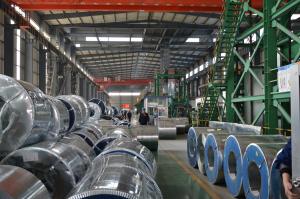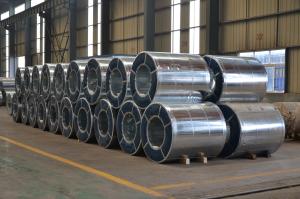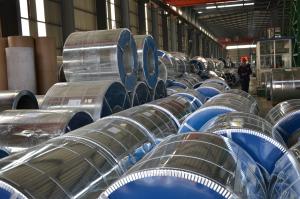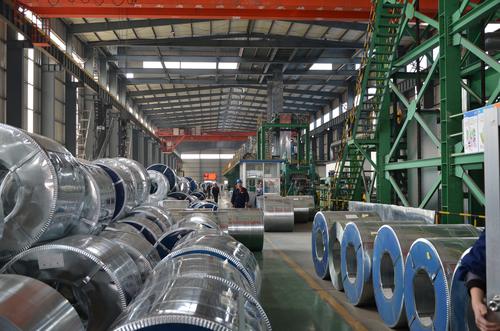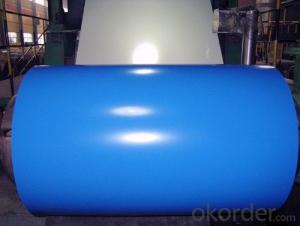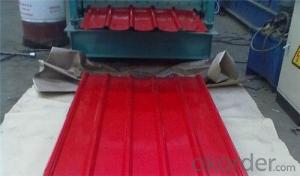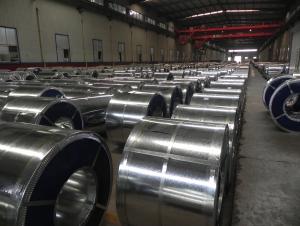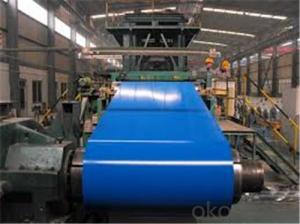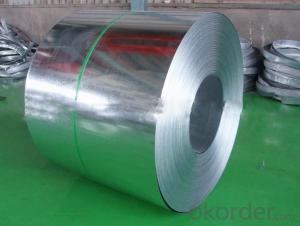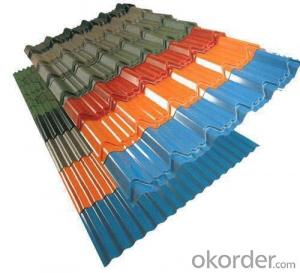galvanized steel coils
- Loading Port:
- China Main Port
- Payment Terms:
- TT OR LC
- Min Order Qty:
- -
- Supply Capability:
- -
OKorder Service Pledge
OKorder Financial Service
You Might Also Like
1) Quality Standard & Grade: JIS G3302, SGCC / ASTM 653M CQ/ EN10142 DX51D+Z
2) Thikness tolerance: +/-0.02mm Width tolerance:+/0.02mm
3) Zinc coating weight: 50g/m2
4) WEIGHT OF PER COIL: 3-5MT
5)Technology: cold rolled
6) Surface of Product: regular spangle / big spangle/ small spangle; Surface Treatment: chromated , non oiled, skin passed
7) Packing: export standard packing,packed with moisture resistant paper and metal
wrapping,securely tied for export,on metal skids7) Country of Origin :
SIZE:0.35*914
- Q: What are the different methods of coil rewinding for steel coils?
- There are several different methods of coil rewinding for steel coils, each with its own advantages and considerations. One common method is the slitting and rewinding process. This involves cutting the original steel coil into narrower strips, often referred to as "slits," and then rewinding these slits onto separate reels. Slitting and rewinding allows for customization of the coil width and is commonly used in industries such as automotive, construction, and packaging. Another method is the oscillate winding technique. This method involves rewinding the steel coil in a back-and-forth manner, creating a tighter and more compact coil. Oscillate winding is particularly beneficial for reducing coil deformation during transportation and storage, as well as optimizing material usage. Additionally, the pancake coil winding method is often employed for steel coils. With this technique, the steel coil is rewound in a flat, pancake-like shape, allowing for easier processing and handling. Pancake coils are often used in applications where space is limited, such as in electrical transformers. Furthermore, some advanced coil rewinding methods utilize automated equipment, such as robotic systems or computer-controlled winding machines. These technologies ensure precise and consistent rewinding, reducing human error and improving overall efficiency. Ultimately, the choice of coil rewinding method depends on the specific requirements of the application, including coil dimensions, material properties, and desired production output. Manufacturers must carefully consider factors such as coil quality, cost-effectiveness, and equipment capabilities when selecting the most suitable method for their steel coil rewinding process.
- Q: How are steel coils coated?
- Steel coils are typically coated through a process known as coil coating, which involves applying a protective layer to the surface of the steel. This is done by passing the coil through a series of rollers that apply the coating material evenly across the entire surface. The coating can be applied using various methods such as roll coating, spray coating, or electrostatic coating, depending on the desired finish and properties. The coated steel coils are then cured or baked to ensure the coating adheres properly and provides the desired level of protection and durability.
- Q: i have a guitar with three nylon three steel strings. Am i able to replace the nylons with steel strings?
- DO NOT PUT ACOUSTIC (steel) STRINGS ON A CLASSICAL GUITAR. Classical guitars are not built to withstand the tension of steel strings. putting steel strings on a classical guitar can cause irreparable damage to the neck, where the neck joins the body and the heel. Classical guitars have nylon strings. Yes 3 of them look like steel strings, but these are actually metal wrapped around a nylon core. Acoustic guitars are metal strings. The wound strings on an acoustic have a metal string core. Classical guitars tend to have a wider neck and are more for classical music, flamenco, finger picking, etc. Acoustic guitars can have lower tension strings put on them (e.g. martin silk and steel) as the guitar can be adjusted to take the lighter string tension placed on the neck and heel. Martin Silk and Steel Strings can also be put on a classical guitar as they have a lot lower tension than steel and they give a louder more acoustic sound.
- Q: What is the average shelf life of a painted steel coil?
- The average shelf life of a painted steel coil can vary depending on various factors such as the quality of the paint, environmental conditions, and storage methods. However, on average, a well-maintained painted steel coil can have a shelf life of 10 to 20 years.
- Q: What are the different types of steel coil slitting methods?
- There are three main types of steel coil slitting methods: rotary slitting, loop slitting, and oscillating slitting. Rotary slitting involves using a circular knife to cut the coil into smaller strips. Loop slitting involves creating a loop in the coil and then cutting it using a straight knife. Oscillating slitting involves using a reciprocating knife to make a back-and-forth motion while cutting the coil. These methods allow for precise and efficient slitting of steel coils into narrower strips.
- Q: Already on my team is Empoleon lvl 82Heatran lvl 74Scizor lvl 34Magnezone lvl 38What other steel types should I choose?
- Skarmory, Steelix, Metagross, or Bastiodon. Personally I would switch Heatran, as I don't feel right using Legendaries.
- Q: How are steel coils inspected for coil weight accuracy after processing?
- Steel coils are typically inspected for coil weight accuracy after processing by using weighing scales or load cells that are capable of accurately measuring the weight of the coil. The coil is placed on the scale or load cell, and the weight is compared to the target weight specified for that particular coil.
- Q: what do they use to make stainless steel?and can stainless steel be melted again and again without losing it's Specifications
- The stainless steel is a family of ferrous alloys containing at least 11% chromium. The effect of this amount of chromium in steel in reducing corrosion is dramatic. There are many grades of stainless steels. By varying the chemical composition, heat treating, and cold-working, a wide range of properties is achieved. There are three types of precipitation hardening stainless steels: *martensitic types, which are supplies in the martensitic condition, are hardened by a simple aging treatment of the fabricated part. *Semi austenitic types, which are supplied in the austenitic condition, are transformed to martensite by special heat treatment before precipitation hardening. *the austenite in the austenitic types is precipitation hardened directly. The heat treatments of precipitation-hardening stainless steels are chosen to optimize mechanical properties. Precipitation hardening generally results in a slight increase in corrosion susceptibility and an increased susceptibility to hydrogen embrittlement.
- Q: I like steel strings but don't want to get a new guitar. Is that my only option?
- It will permanently ruin the guitars neck. Acoustic guitars have an adjustable metal rod in them called a “Truss Rod” that allows the neck to withstand steel string tension. How about putting on high tension nylon strings ?
- Q: How are steel coils used in the production of lighting fixtures?
- Lighting fixtures rely on steel coils as a vital element. These coils are typically crafted from top-notch steel, which imparts durability and strength to the end result. In the manufacturing process, the steel coils undergo an initial uncoiling before being processed through a series of machines. These machines cut and mold the steel into various parts and components essential for lighting fixtures. To achieve the desired shapes and sizes, the steel is often bent, stamped, or rolled. These parts may include the base, frame, arms, or other structural elements of the lighting fixture. Once the steel components are shaped, they are subjected to further processing and finishing. This may involve techniques such as welding, polishing, or coating to enhance the steel's appearance and protect it from corrosion. When the steel parts are finalized, they are combined with other components like electrical wiring, bulbs, shades, and switches to create the complete lighting fixture. The utilization of steel coils in lighting fixture production guarantees that the final products are robust, long-lasting, and capable of enduring various environmental conditions. Steel's strength allows for the creation of intricate designs and shapes, enabling manufacturers to produce lighting fixtures that are not only functional but also visually appealing. All in all, steel coils play a pivotal role in lighting fixture production by providing the necessary strength, durability, and versatility required for these products.
Send your message to us
galvanized steel coils
- Loading Port:
- China Main Port
- Payment Terms:
- TT OR LC
- Min Order Qty:
- -
- Supply Capability:
- -
OKorder Service Pledge
OKorder Financial Service
Similar products
Hot products
Hot Searches
Related keywords
